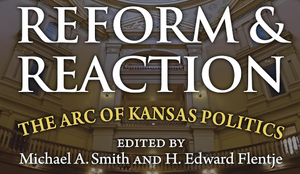By Mike Durall
The book is titled Reform and Reaction: The Arc of Kansas Politics, edited by Michael A. Smith and H. Edward Flentje, published by the University Press of Kansas. It covers Kansas politics from 1960 until 2018. This book is a “must read” for Kansas political junkies.
The book covers governors John Anderson, William Avery, Robert Docking, Bob Bennett, John Carlin, Mike Hayden, Joan Finney, Bill Graves, Kathleen Sebelius, Mark Parkinson, Sam Brownback, Jeff Collyer, and the election of Laura Kelly. Six Democrats and six Republicans.
In 1960, the big issue was the abandonment of the policy of one representative from each of the 105 Kansas counties. This dramatic redistricting reflected the demographic movement of people from rural to urban areas.
The 1970s brought significant reforms statewide, based in part on the controversy surrounding outgoing governor Fred Hall getting himself appointed to the state supreme court. Elected officials of both parties were moderates who focused on agriculture, roads, and utility costs.
The 1980s were the John Carlin and Mike Hayden administrations. Party control of the governor’s office shifted four times between 1978 and 1990. Major issues of the times included tax policy, infrastructure, economic development, and reforming liquor and gaming laws.
In 1990, Joan Finney was elected governor. She was the first woman to hold this office, the first Catholic, and the oldest, at 66 years of age. She advocated for direct citizen action on legislative issues which was passed by the House but failed in the Senate.
Until this time, the legislature focused on bread-and-butter issues. But the anti-abortion Kansas Right to Life group that was formed in 1991 brought cultural issues into the mix. Hot button issues also included sex education and gay rights.
The era from 1994 to 2010 were the administrations of Bill Graves, Kathleen Sebelius, and Mark Parkinson. These years saw a distancing between moderates and conservatives. But bipartisan groups worked on highway construction, education, health care, economic development, and environmental issues.
Kansans elected Sam Brownback as governor in 2011. He supported a zero-income tax model. He also became a lightning rod for advocating against abortion and same-sex marriages.Brownback is in the running for the most controversial governor in Kansas history.
Lieutenant Governor Jeff Colyer became governor in 2018, when Brownback’s leadership was repudiated, and he left the state. In the Republican primary of that year, Colyer lost to Kris Kobach by 343 votes. Kobach, in turn, lost the general election to Laura Kelly.
This is one great book.


